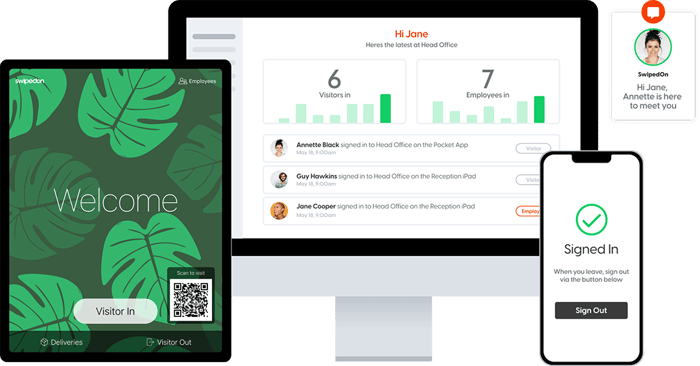7 Skills Every Receptionist Needs in 2024

Receptionists are key front-of-office staff and are instrumental to many industries and organizations. They’re one of the first people that visitors engage with and play a huge role in upholding the company’s reputation. While the hybrid workplace is flexible to working from home or working from the office, receptionists will still be crucial for providing good first impressions.
Receptionist skills go far beyond a simple meet and greet. Often, these multi-tasking superheroes are tasked with many other major responsibilities around administration and security as well, like responding to incoming mail and ensuring no unauthorized visitors enter the building. In this article, we’ll go through 7 of the top skills every receptionist needs and why they’re important for the future of your business.
5 Receptionist skills your front of house staff must have
- 1. Strong Technology Skills
- 2. Great Soft Skills and Emotional Intelligence
- 3. Fantastic Communication Skills
- 4. Excellent Time Management Skills
- 5. An Independent Approach to Work
- 6. Problem-Solving Abilities
- 7. Visitor Management
1. Strong Technology Skills
Receptionists often perform several administrative tasks, from receiving visitors and answering phone calls, to scheduling appointments for clients and customers. These administrative tasks often require the use of different hardware and software. Many receptionists are already expected to have previous experience using phone systems, printers, copiers, and familiarity with MS Word and Excel. In a world where agile hybrid working arrangements are commonplace, and businesses are beginning to digitise the sign in process for visitors and employees, it's more important than ever that your receptionist has the skills to quickly get to grip with digital software.
Knowing industry-specific software can be a big advantage as well. For example, knowing how to operate a workplace sign in system to streamline the day-to-day workplace sign ins for visitors and employees, book car parks, company vehicles, desks and more. Having prior experience with applications like Calendly or Google Calendar to schedule meetings for key staff members can be very useful skills for receptionists.
While it’s hard to predict which technologies and tools will be necessary in the future, key receptionist skills include adaptability and the ability to learn how to use new software applications. If you or your receptionist or team of receptionists lack strong technology skills, it’s important to express a willingness to learn new things and be open to trying new tools.
2. Great Soft Skills and Emotional Intelligence
As the gatekeeper to your organization, your receptionist, and other customer-facing staff, must have great soft skills and emotional intelligence. Today’s consumers and visitors can be challenging to deal with, and one poor customer complaint can seriously damage your brand. In fact, 39% of customers will avoid a company for two years after one bad customer service experience.
When it comes to front desk skills, soft skills are often passed over for hard skills when it comes to hiring a receptionist, it’s important any customer-facing staff are empathetic, friendly-yet-firm, punctual, and possess key relationship-building skills. Not only will receptionists be dealing with guests, but they’ll also be working with other staff members and contractors.
Heather Dallas from the BDJ team says finding receptionists with strong emotional intelligence skills requires a conscious effort during the interview process.
“Ask questions to give examples of evidence about their mind set and enthusiasm,” she says. “You can train people in skills like time management, telephone manner and technical skills. It is essential they want to do the job and have good rapport skills such as emotional intelligence, empathy, compassion, building connections with people, putting themselves in patients' shoes, etc.”
3. Fantastic Communication Skills
Receptionists are constantly interacting with guests who enter the facility, people who call in, and employees checking in and out. They’re also responsible for handling basic customer service issues and responding to email inquiries online.
Juggling customer service activities and administrative tasks is no easy feat, especially when being constantly interrupted. That’s why it’s increasingly important for receptionists to have robust communication skills. Receptionist duties and skills are a mix of communication, administration, and public relations. To understand information quickly and accurately, receptionists should learn how to be a good listener, engage in active listening, provide clear and concise information, and be empathetic and respectful of others. Your receptionist should also have excellent writing and editing skills for drafting and proofing professional emails.
4. Excellent Time Management Skills
As mentioned above, front desk receptionist skills entail the completion of many tasks within a day. Balancing all these responsibilities while being constantly interrupted can hurt productivity levels. If you and your team members feel as if you’re not getting enough completed within the day, it’s a good time to invest in time management skills or workplace management software (huhum, like SwipedOn 👋 ) that will help take away some of the lengthy manual tasks, to reduce overwhelm for your receptionists and streamline workplace operations.
Among the skills needed for a receptionist, good time management is essential. Time management skills allow team members to structure their work effectively to accomplish goals. A good way to start is to set short and long-term SMART goals. They can also work on managing their calendars and prioritize time more effectively.
If your receptionist is still struggling to finish all the tasks required, consider delegating (where possible), scheduling tasks beforehand and avoid multitasking since it causes productivity to drop by 40%. We recommend leveraging software tools like a time tracker app, or to use other SaaS tools like Notion that can help them keep organized. This should help them manage time more effectively.
5. An Independent Approach to Work
Since receptionists are often isolated from the main office, they need to have the skills to be independent workers. Having a team of receptionists can help boost morale and productivity. However, if you just have one receptionist at your company’s front desk, they will need to have the desire to work autonomously, have great initiative and be ready to deliver work, even when their manager or boss is not there.
Often, receptionist skills include not only being responsible for administrative tasks and signing in visitors, but also needing to work on special projects or provide support for individual executives. It’s these circumstances where the receptionist needs to adjust the original job description to fit the new requirements. While every business is different, receptionists that have the skills to think quickly on their feet, have great problem-solving skills, possess a positive attitude, and are always eager to learn, tend to perform well regardless of the changing business environment.
According to Jane Streat, Head of Client Services at Lexington Reception Services, “Being a receptionist is not an easy job. You have to think on your feet, be proactive and multitask. You need to know everything and everybody, and keep smiling even at the person who is shouting at you because they can’t remember who they are there to see. But it is also a really rewarding job - no day is the same, you learn lots of different skills and there is opportunity to progress.”
6. Problem-Solving Abilities
Identifying and Addressing Common Reception-Related Challenges
Receptionists are tasked with a mix of predictable and unpredictable duties and must often respond to novel situations based on visitor requests. They should have strong problem-solving skills to resolve customer and visitor questions based on a natural ability to think on their feet. The receptionist is the face of the company, so it's important that they are nimble and able to quickly resolve issues to the satisfaction of customers and employees.
Knowing When To Escalate Issues to Higher Management
Not every request can be addressed directly by the receptionist; it will sometimes be necessary to refer the issue to a manager. The receptionist should have a clear understanding of the limits of their responsibility and who to turn to for help.
Strategies for Resolving Conflicts With Visitors or Colleagues
There are all kinds of conflicts at the front desk: visitors can be delayed, packages can go missing, schedules can get mixed up, etc. Your receptionist should be confident in handling low-level conflict and addressing the needs of visitors while upholding company policy. Specific training on conflict resolution, as well as scenario planning for common situations like delayed meetings, unavailable managers, and more, will be very useful to the new receptionist.
7. Visitor Management
Visitor management no longer needs to be done manually through a hodgepodge of paper records. A modern digital visitor management solution allows a receptionist to check a guest in, notify relevant parties of their arrival, and control access to the physical premises. This digital solution reduces the burden on the receptionist and frees them up for other tasks.
The best modern visitor management tools will issue real-time notifications to the individuals organizing a meeting that their guest has arrived. They can then greet the guest and escort them to the reserved meeting space. The result is improved organization, better efficiency, and a better visitor experience (guests feel better taken care of when their hosts arrive promptly and seem prepared for them).
The TLDR
Receptionists play an extremely important role in an organization. They set the first impression for guests entering an organization, which can have a huge impact on the way clients view the business. Furthermore, they often provide key administrative support and can also lend a helping hand with special projects. While the role of the receptionist is evolving, the 5 key skills every receptionist should master include being technology-proficient, possessing emotional intelligence, having great communication, organizing time well, and adopting an independent approach to work.
If you’re interested in helping yourself, your team or your receptionists upskill and be more efficient with their time, sign up for SwipedOn's 14-day free trial today.




-929560-edited-003563-edited.jpg)





 Germany - Deutsch
Germany - Deutsch